I've been in a rotten mood that turned into being down in the dumps for the past few weeks. The usual things have contributed, money, health, love, work, money. You know, the type of things people without two brain cell to rub together tell you to pull your socks up over. Even getting a literary agent that I like after querying for the past eight months didn't cheer me up. My mood only improved upon reading the following.
‘Father's a well paid architect, mother's a published author. Own their own multi-storey property and are in-line to inherit the grandparents' house and yacht. The only question is whether Peppa will become a columnist for the Guardian or the Telegraph?’
Posted on the day that all corners of the press announced that Peppa Pig had turned 21 and had a new baby sister. A shitposter (the most astute demographic on the internet), wrote it.
I've been giggling about it for the past few weeks, whenever I remember. Followed up usually by a bitter laugh as I can't imagine I'll ever write a paragraph so perfect.
It came a week after I had seen the following post by journalist and (former) editor Adam Bienkov, a journalist I rate and who does consistently great work at Byline Times and his own Substack.
‘When I was at Politics.co. uk I used to commission this guy to write straight-down-the-line, reasoned academic analysis of public opinion. His decade-long descent into far-right drift has been something to watch.’
It couldn't have pissed me off more. In 2018, Matt Goodwin was on a panel organised by Unherd called, 'Is Rising Ethnic Diversity a Threat to the West?’. We all knew. Some just didn't care to see him as a problem.
The blithe presumption of white, male expertise, reason, and balance that proliferates the media has led us all down a merry path to where Nigel Farage is the presumptive Prime Minister. It's maddening.
David Jamieson, the editor of Conter Scot, a publication dedicated to challenging the Scottish establishment wrote the following not long after:
You occasionally hear that establishment British journalists are evading the truth of Gaza ‘for Israel’.
Wrong in my opinion. For them, this is about Britain, ‘the west’ and a certain idea of transatlantic liberalism. It’s also about their own class origins and proximity to power.
Most of these people know very little about Israel or Palestine. They’ve adopted the idea that ‘it’s complicated’ from prejudices about their own society and their role within it. The west backs Israel, and so it must be the just actor *on some level*
Their decades of socialisation in elite education, cushy employment and access to power, means that they can defer the location of that essential righteousness forever. The alternative, that western foreign policy is *defined* by its cynicism, is simply not possible.
To accept the reality of what is happening in Gaza, would be to experience a kind of ego death. They are bound up psychologically with the image of their state, their class, and the transnational connections of both.
They don’t need to know about the history or the social reality of Israel-Palestine. They have a truth that endures all ‘incidental’ facts: ‘we are the best society, and I am from the best part of that society’. If things were twice as bad, this would still be true.
I say overcoming this ideology would lead to ego death, but it would also destroy their social position. Give up on this idea and it’s goodbye job, goodbye friends (omg did you hear about John Smith? He’s had some kind of breakdown I think) goodbye nice, successful life.
This is all unconscionable. So we go on knowing that the west maintains a kind of unseen, almost unknowable goodness. It’s an attitude made so much more plausible by the fact that everyone you know is also going along with it. Can all the best and brightest be wrong?
I nodded along to every word as I read it and answered his ending question by saying, yes they can be.
That alongside the horrific images that we all see daily of Palestinian children being shot in the head while collecting Aid, mother's shot in the belly where their baby grows, men and women and children shredded by bombs in their tents, is what's made me really depressed.
The author James Baldwin said, “You are bearing witness, helplessly, to something in which everybody knows. And nobody wants to face.” However I don't think even he could imagine bearing witness to the pure savagery that has been unleashed in the past two years by Israel with seemingly no end in sight.
I couldn't help but agree with the executive producer of AJE Faultlines, Laila Alarian when she wrote, ‘It's very clear to me every day that the genocide of Palestinians in Gaza, which has broken the psyche of those with a heart and conscience, is just background noise for so many others.’
The paucity of journalism about Israel and Gaza's trapped, exhausted and starving population is never clearer than in the headlines and reporting by the BBC, in the rhetoric of LBC radio and the both sideism of the New York Times. The Palestinian British journalist, Hamza Yusuf documents the egregious oversights and/or useful fool propaganda every day. He never seems to run out of material.
At the end of April a piece of research was published in The Conversation by Imke Henkel, a lecturer in Journalism and Media at the University of Leeds. ‘New survey shows the extent of class privilege in UK journalism’. For some reason it got little attention (I have my suspicions as to why) but I think every journalist and editor in the UK has an obligation to read it. I think it would help address some of the points that David Jamieson makes about Israel, Gaza, class and power above.
Imke starts by saying:
UK journalism has a class problem. This statement will not surprise most people familiar with UK newsrooms. What is astonishing, though, is the scarcity of empirical data that could help us better understand the extent to which class inequality affects journalists and their work.
For the first time, research by my colleagues and me for the report UK Journalists in the 2020s uses a representative sample of UK journalists to measure their socioeconomic background.
Other quotes that stood out to me included:
– Leading news editors, broadcasters and newspaper columnists are about six to seven times more likely to be privately educated than the general population.
–Twenty-two percent of journalists in our sample attended a fee-paying secondary, and 13% attended a fee-paying primary school. Around 6% of the general pupil population in England attends private schools, and fewer in Scotland, Wales and Northern Ireland.
– Our data does not suggest that a privileged upbringing makes it more likely for journalists to hold a top management position. Where it does make a difference, though, is whether they work for national media or outlets with international presence (like the Guardian or the FT).
– Of those who do only 9% come from a working-class background, while 72% come from a privileged one (the rest come from the middle groups in our classification) . In contrast, 20% of journalists working for local and regional outlets (including regional arms of national outlets, such as BBC Wales) have a working-class background, and 57% grew up in a more privileged household.
– Both women and journalists from an ethnic minority background seem to drop out of the profession after the age of 50. –
– Journalists with an Asian or Black background in particular remain underrepresented compared to the overall population, as they were in 2015.
– Female journalists are also still less well paid, less likely to have a permanent contract or to hold a top management role than their male colleagues.
Is it any wonder that a day doesnt go by with public corrections such as this?
Over 200 journalists have been killed by Israel in targeted strikes, execution style shootings and by fire. I am yet to understand why, apart from a couple of notable exceptions, journalists aren't broadcasting or writing about this truth every day.
“Since the war in Gaza started, journalists have been paying the highest price – their lives – for their reporting. Without protection, equipment, international presence, communications, or food and water, they are still doing their crucial jobs to tell the world the truth.
Every time a journalist is killed, injured, arrested, or forced to go to exile, we lose fragments of the truth. Those responsible for these casualties face dual trials: one under international law and another before history’s unforgiving gaze.”
— Committee to Protect Journalists
So with all that said I don't think I am depressed. I think I am bitter. And bitterness is no place to create anything from. I'm out ✌🏿
A BIG thank you to all my paying subscribers. I couldn’t justify publishing this newsletter if not for you.

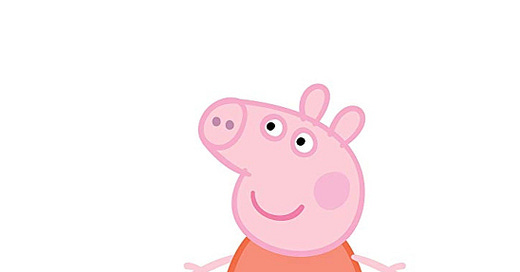




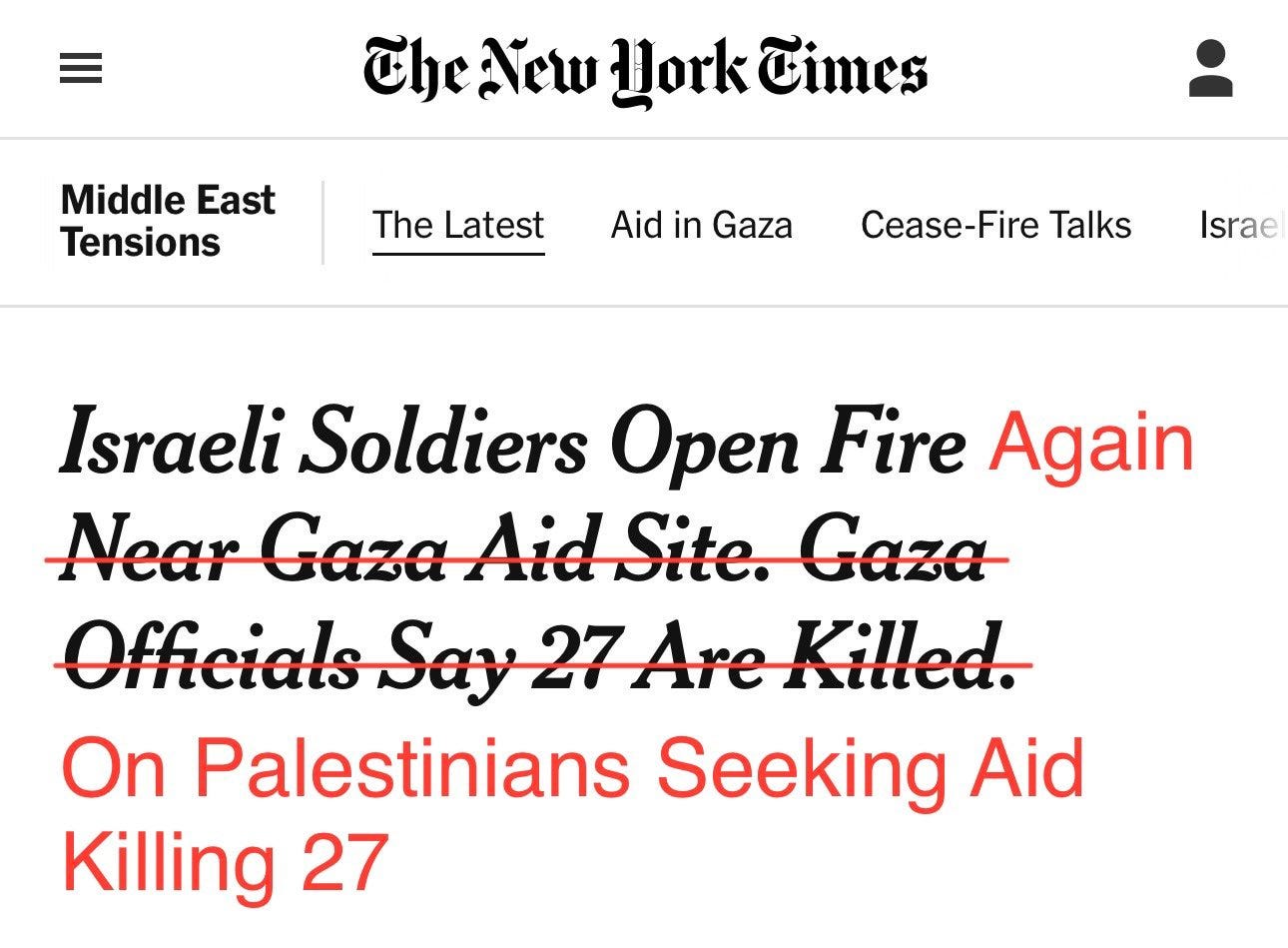
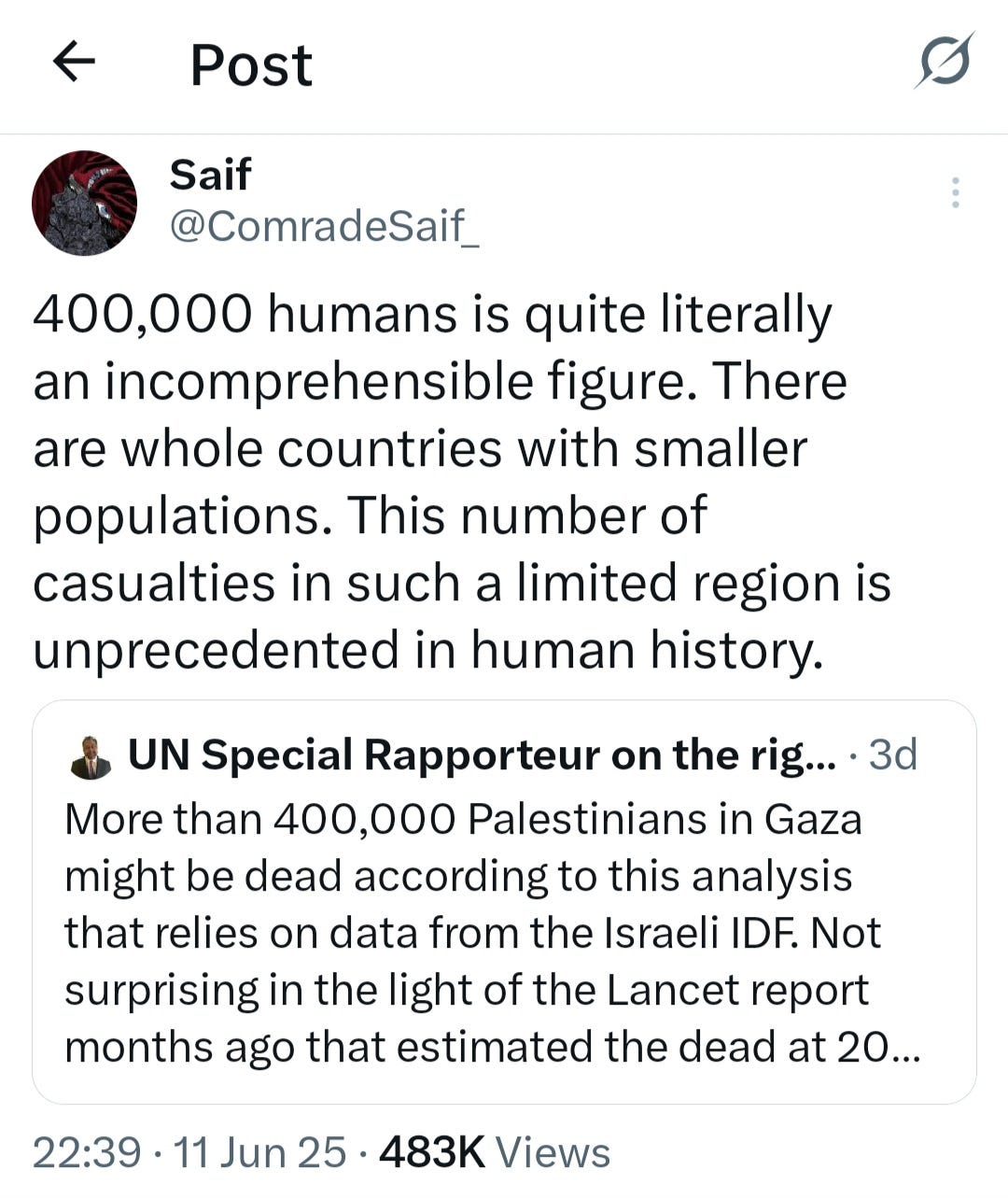
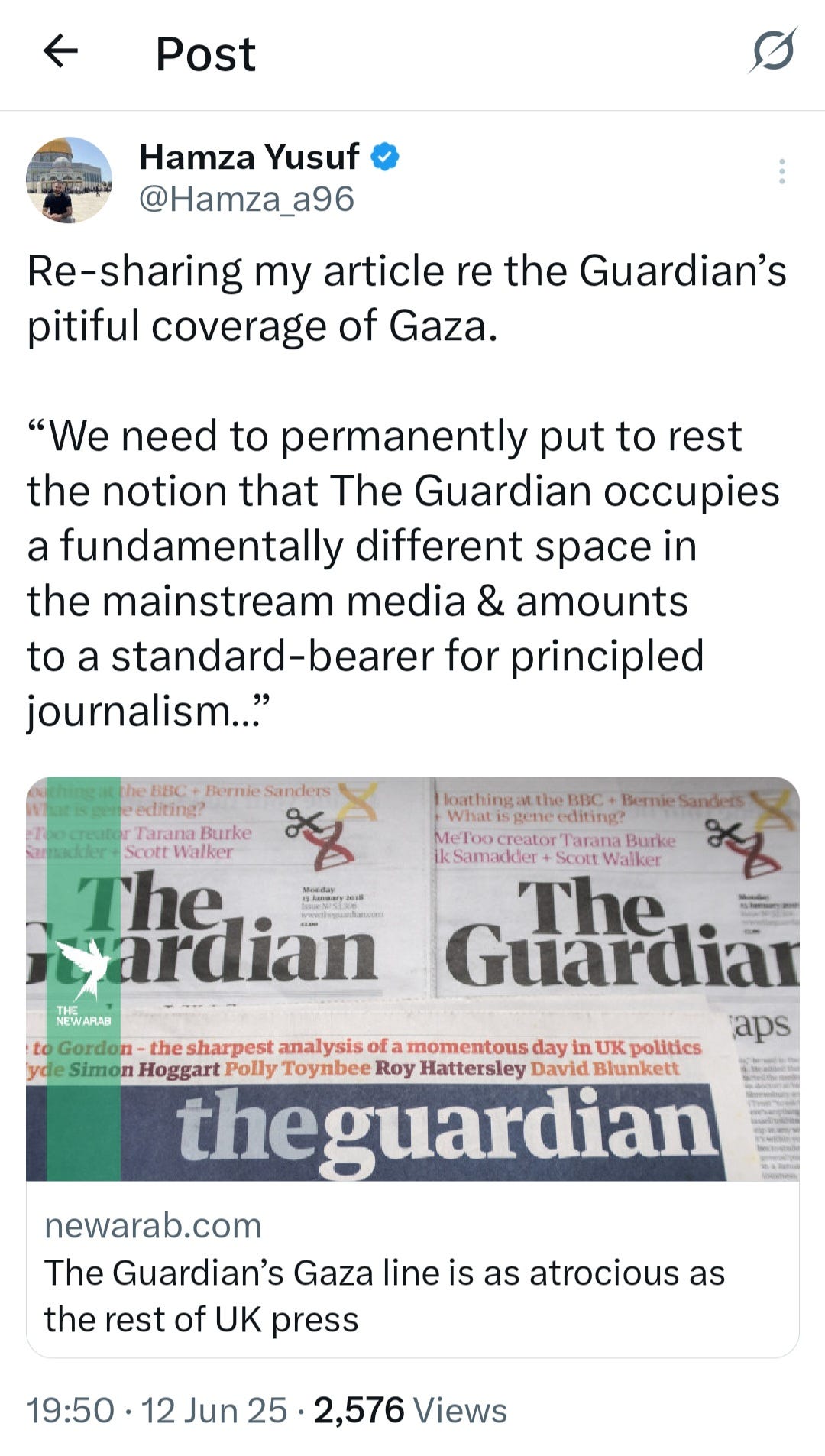
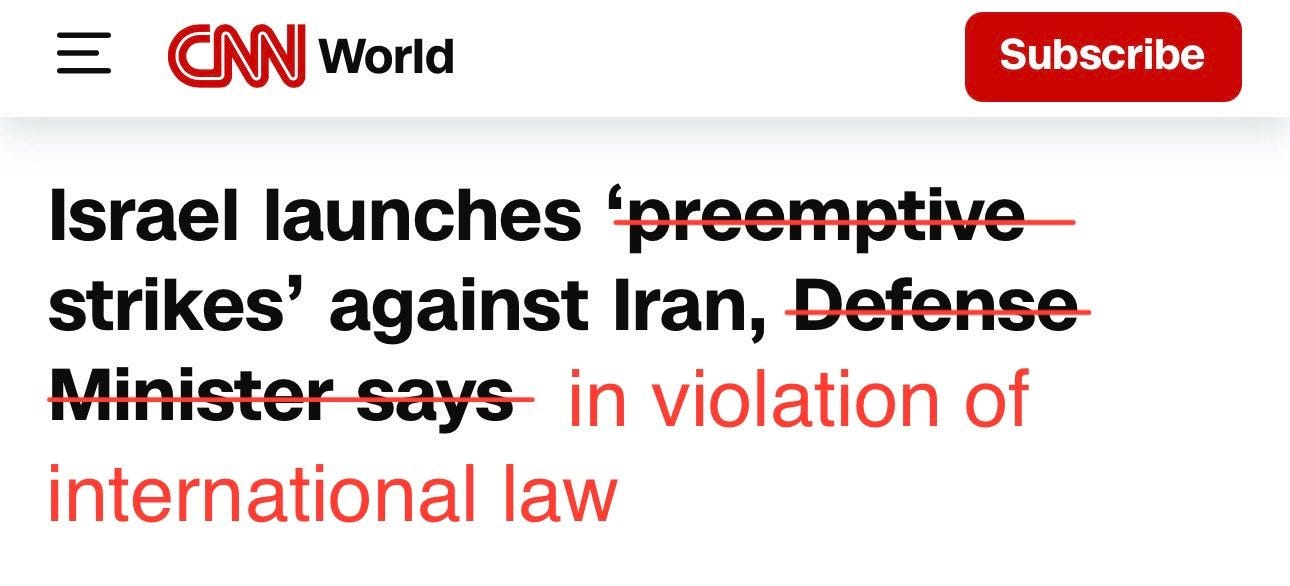

Loved reading this even though it is depressing.